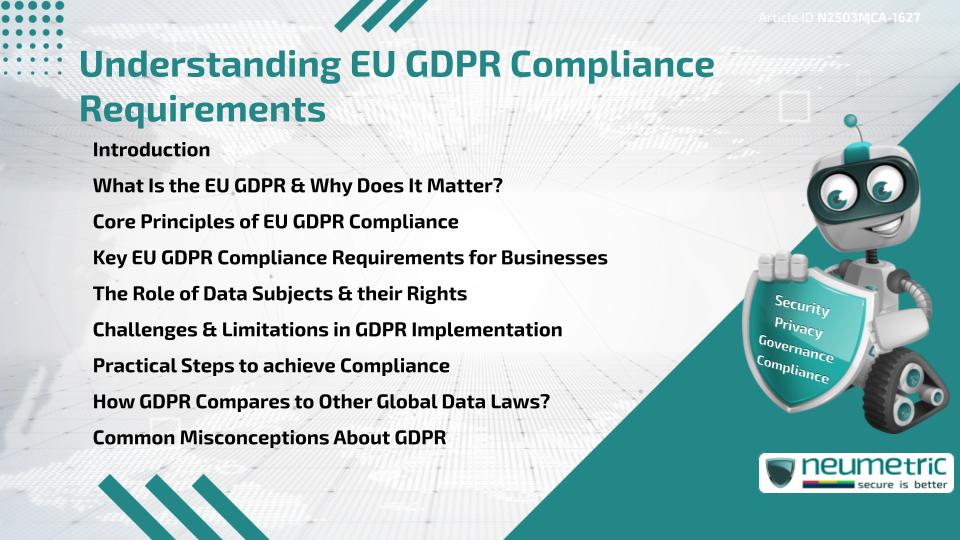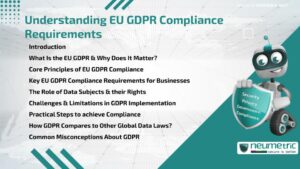Table of Contents
ToggleIntroduction
The General Data Protection Regulation [GDPR] is one of the most significant Privacy laws in the World. Enforced across the European Union [EU], it sets strict rules on How Organisations collect, store & use Personal Data. Meeting EU GDPR Compliance Requirements is not just a Legal duty, it’s also a way to build trust with Customers & Partners. In this Article, we explore What these requirements are, Why they matter & How to meet them effectively.
What Is the EU GDPR & Why Does It Matter?
The GDPR came into force in May 2018 & applies to all Organisations that handle Personal Data of individuals in the EU. This includes Businesses based outside the EU if they offer goods or services to EU residents. The goal is to give Individuals more control over their Data & to harmonise Data Protection rules across Europe.
Non-compliance with EU GDPR Compliance Requirements can result in heavy Fines, up to four(4) Percent of a Company’s annual global turnover. More importantly, Non-compliance can severely damage a Company’s Reputation & Customer Trust.
Core Principles of EU GDPR Compliance
To understand the full scope of EU GDPR Compliance Requirements, it helps to look at its Core Principles. These include:
- Lawfulness, Fairness & Transparency
- Purpose Limitation – Data must be collected for specified purposes
- Data Minimisation – Only collect what is necessary
- Accuracy – keep Data up to date
- Storage Limitation – Data should not be kept Longer than Needed
- Integrity & Confidentiality – Secure Data against Unauthorised access
These Principles form the foundation for all other GDPR obligations.
Key EU GDPR Compliance Requirements for Businesses
Businesses must take several steps to meet EU GDPR Compliance Requirements. Some of the most important ones include:
- Appointing a Data Protection Officer [DPO] for Large-scale Data Processing Operations
- Carrying out Data Protection Impact Assessments [DPIAs] for High-risk processing
- Maintaining Records of Processing Activities [RoPAs]
- Implementing appropriate Technical & Organisational Security Measures
- Reporting Data Breaches within Seventy-two (72) hours
- Obtaining clear & informed consent from Users
All these steps aim to ensure that Personal Data is handled responsibly & transparently.
The Role of Data Subjects & their Rights
EU GDPR Compliance Requirements are built around protecting individuals, also called Data subjects. They have the right to:
- Access their Data
- Correct inaccurate Data
- Delete Data (right to be forgotten)
- Restrict or Object to Processing
- Port their Data to another Provider
These rights must be clearly communicated & made easy to exercise.
Challenges & Limitations in GDPR Implementation
Despite its strong protections, implementing GDPR is not always straightforward. Smaller Businesses may struggle with the Resources needed to meet all EU GDPR Compliance Requirements. Data Transfers outside the EU also add complexity due to differing Privacy Standards.
Moreover, Consent Management & User rights handling can be difficult in Fast-paced Digital Environments. While GDPR promotes Privacy, it can be seen as restrictive by some Businesses, especially those that rely heavily on Data-driven advertising or analytics.
Practical Steps to achieve Compliance
To meet EU GDPR Compliance Requirements, Businesses should start with a clear plan:
- Map all Data Flows & Storage Systems
- Review current Privacy Policies & Update them
- Train staff on Data Protection Awareness
- Implement strong Access Controls & Encryption
- Create a clear Breach Response Plan
Working with External Consultants or Legal Experts can help where Internal Expertise is lacking.
How GDPR Compares to Other Global Data Laws?
GDPR is often seen as the gold Standard of Data Protection. Compared to laws like the California Consumer Privacy Act [CCPA] or the Personal Information Protection & Electronic Documents Act [PIPEDA], GDPR is broader in scope & more demanding in terms of Compliance.
Still, many Global Laws share common goals. Understanding how GDPR fits into the Global landscape helps Multinational Businesses stay Compliant across regions.
Common Misconceptions About GDPR
There are a few common misunderstandings about EU GDPR Compliance Requirements:
- It only applies to EU businesses – False, it applies to anyone handling EU Data
- Consent is always required – Not always, other Lawful bases like Contract or Legal obligation may apply
- Once Compliant, always Compliant – GDPR is an ongoing Process, not a One-time Task
Correcting these misconceptions is key to effective implementation.
Takeaways
- EU GDPR Compliance Requirements aim to protect Personal Data & ensure Accountability.
- Businesses must follow Principles like Transparency, Data Minimisation & Security.
- Compliance involves Legal, Technical & Operational changes.
- Challenges exist, but with clear Planning & Awareness, GDPR Compliance is achievable.
FAQ
What types of Businesses must follow EU GDPR Compliance Requirements?
Any Business that collects or processes Personal Data of EU residents, regardless of its Physical Location.
Is Consent always required under EU GDPR Compliance Requirements?
No, other Lawful bases like Legitimate Interest, Contract Performance or Legal Obligation may apply.
What is a Data Protection Officer & When is one needed?
A DPO is responsible for overseeing GDPR Compliance. One is required for Large-scale or Sensitive Data Processing.
How soon must a Data Breach be reported?
Under EU GDPR Compliance Requirements, Breaches must be reported to Authorities within Seventy-two (72) hours.
Are Small Businesses exempt from GDPR?
No, size does not exempt a Business. However, the scale of Data Processing may affect certain Obligations.
What are the Penalties for not meeting EU GDPR Compliance Requirements?
Fines can go up to Four(4) Percent of Annual Global Turnover or €20 million, whichever is Higher.
How does GDPR affect Data Transfers outside the EU?
Businesses must ensure that recipient countries provide adequate protection or use safeguards like Standard contractual clauses.
Can Personal Data be kept forever if stored Securely?
No, EU GDPR Compliance Requirements include Data Retention limits. Data must be deleted when no longer needed.
Need help?
Neumetric provides organisations the necessary help to achieve their Cybersecurity, Compliance, Governance, Privacy, Certifications & Pentesting goals.
Organisations & Businesses, specifically those which provide SaaS & AI Solutions, usually need a Cybersecurity Partner for meeting & maintaining the ongoing Security & Privacy needs & requirements of their Clients & Customers.
SOC 2, ISO 27001, ISO 42001, NIST, HIPAA, HECVAT, EU GDPR are some of the Frameworks that are served by Fusion – a centralised, automated, AI-enabled SaaS Solution created & managed by Neumetric.
Reach out to us!





